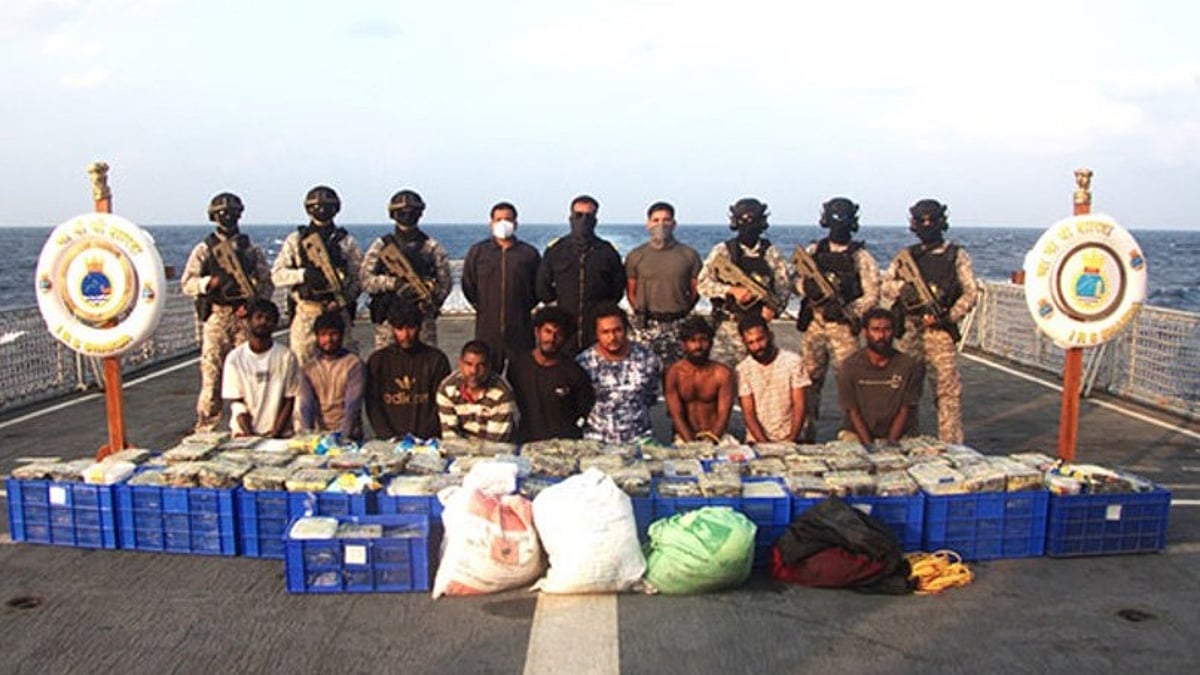Certain maritime crimes have no regard for territorial waters. Such is the case involving two Sri Lankan fishing boats seized by the Indian Navy and Sri Lankan Navy joint operation. In a statement, the Indian Navy reports that the naval forces intercepted the boats in the Arabian Sea based on information regarding narcotics smuggling. The operation resulted in the seizure of approximately 500 kg of cocaine, one of the largest seizures of the drug in the region.
Cross-Border LinksPosted by AI on 2025-08-25 14:33:36 | Last Updated by AI on 2025-08-25 21:04:09
Share: Facebook | Twitter | Whatsapp | Linkedin Visits: 0

The Indian Navy commended the joint operation, stating it demonstrates "the combined resolve of both navies to address regional maritime challenges and ensure safety and security in the Indian Ocean Region."
This seizure, however, is more than just a legal blow to criminal elements involved in narcotics trafficking. It also underscores the growing role of maritime patrols in combating narcotics smuggling in the Indian Ocean Region (IOR). This, in turn, is shaping India's and Sri Lanka's response to transnational organized crime.
According to the United Nations Office on Drugs and Crime, ocean trafficking requires sophisticated logistical operations, making it harder to detect and stop. Further, the same routes used for illegal drugs may be used for other illegal activities, including trafficking in persons and firearms, and illegal wildlife trade.
The IOR is a hub for such activities. As a result, India has enhanced its maritime security capabilities and created an Information Fusion Centre to collate, fuse and disseminate intelligence on "white shipping" activities in the region.
The centre, inaugurated in December 2018, played a guiding role in the recent seizure. Indeed, the interception and seizure would not have been possible without information from the centre and India's naval aircraft surveillance.
This recent operation reinforces India's and Sri Lanka's commitment to addressing maritime security challenges and reinforces the need for increased international cooperation in combating transnational organized crime at sea.
With the recent seizure, it seems that joint India-Sri Lanka naval operations have taken a significant step in the right direction.
Search
Categories
- Sports
- Business
- History
- Politics
- International
- Science & Technology
- Social Issues
- Disaster Management
- Current Affairs
- Education
- Startup Business
- Startup News
- Awards
- Community Services
- Fundraising Events
- Volunteer Services
- Health Initiatives
- Innovations and Initiatives
- In News
- Banners
- Awards
- Partners
- Products
- Press Releases
- News
- Fast Check
- South
- సినిమా
- Gallery
- Sunday Chronicle
- Hyderabad Chronicle
- లైఫ్ స్టైల్
- National
- క్రైం
- ట్రెండింగ్
- జాబ్స్
- అంతర్జాతీయo
- బిజినెస్
- రాజకీయం
- బిజినెస్
- సంపాదకీయం
- నవ్య
- చిత్ర జ్యోతి
- క్రీడలు
- జాతీయం
- తెలంగాణ
- తాజా వార్తలు
- మన పార్టీ
- మన నాయకత్వం
- మన విజయాలు
- డౌన్లోడ్స్
- మీడియా వనరులు
- కార్యకర్తలు
- North East Skill Center News
- Government Schemes
- Entrepreneurship Support
- Employment Opportunities
- Skill Training Programs
- Departments
- Investments
- Initiatives
- Resources
- Telangana IT Parks
- Events & Jobs
- Press Releases
- News
- Airport News
- Newtons Laws of Motion
- Karbonn in Business
- Investments in Karbonn
- Company quarterly sales
- Markets
- Auto News
- Industry
- Money
- Advertisements
- Stock target
- Company Updates
- Stock Market
- Company Sales
- Staffing and HR
- Constituency Assembly
- General News
- Srikalahasti Temple
- Bojjala Sudhir Reddy
- Technology & Innovation
- Sports
- Business
- Products
- Industries
- Services & Trainings
- Tools & Resources
- Technology Integration
- Drug Seizures & Arrests
- Telangana Narcotics
- Law & Enforcement
- Rehabilitation
- Nationwide Drug Policing
- Nigeria Seizures
- Global Operations
- Drug Awareness
- Drug Enforcement Tech
- NCB Drug Seizures
- Judicial Crackdown
- India's Surveillance Tools
- Cross-Border Links
- Women Safety
- Cyber Crimes
- Drug Abuse
- Traffic & Road Safety
- Community Connect
- Public Safety Alerts
- Citizen Assistance
- Nellore City News
- Politics & Administration
- Events & Festivals
- Agriculture & Rural
- Business & Economy
- Health & Wellness
Recent News
- India's Success in the UN Elections ConfirmsCredibility of 'Actionable Conclusions'
- Case papers destroyed in fire: Court allows NCB to present copies of original documents
- Supreme Court Forces Indian Government to Stop Clinical Trials of 162 Drugs
- Problem With Drug Seizures Spurs Calcutta High Court to Allow Charge Sheets Without Chem Reports
- Nagpur Crime Branch Crushes Drug Ring, Seizes 1kg Ganja
- Smuggling syndicate involves senior army officers: MACC
- Punjab's Narcotic Problem
- # Eyes in the Sky: Drastic Increase in Drone Activity near LoC